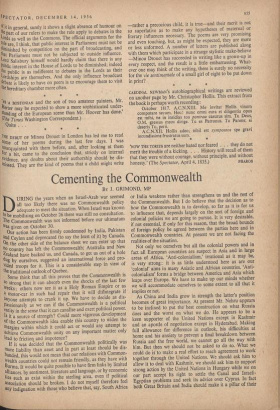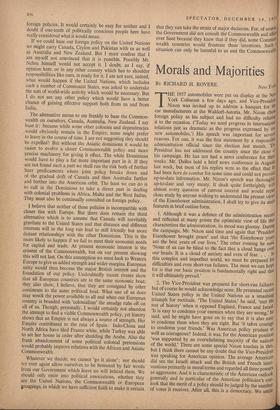Cementing the Commonwealth
BY J. GRIMOND, MP URING the years when an Israel-Arab war seemed ) all too likely there was no Commonwealth policy adequate to meet the situation. When Israel was known ,t° be mobilising on October 26 there was still no consultation. the Commonwealth was not informed before our ultimatum Was given on October 30.
Our action has been firmly condemned by India, Pakistan and Ceylon and deprecated (to say the least of it) by Canada. On the other side of the balance sheet we can enter up that 110 country has left the Commonwealth; Australia and New Zealand have backed us, and Canada, to get us out of a hole dug, by ourselves, suggested an international force and pro- vided troops for it. This is a considerable step in view of the traditional outlook of Quebec.
Some think that all this proves that the Commonwealth is
SO
strong that it can absorb even the shocks of the last few Weeks : others now see it as a Holy Roman Empire or as a motor-car in such bad repair that it will disintegrate if anyone attempts to crank it up. We have to decide as dis- passionately as we can if the Commonwealth is a political entity in the sense that it can canalise and exert political power. Is it a source of strength? Could more vigorous development of the Commonwealth idea enable this country to widen the Margins within which it could act or would any attempt to achieve Commonwealth unity on any important matter only lead to friction and impotence? if it was decided that the Commonwealth politically was More liability than asset and in part at least should be dis- banded, this would not mean that our relations with Common- wealth countries could not remain friendly, as they have with Burma. It would be quite possible to have firm links by limited alliances. by sentiment, literature and language, or by economic ties such as exist within the sterling area, even if political association should be broken. I do not myself therefore feel any indignation with those who believe that, say, South Africa or India weakens rather than strengthens us and the rest of the Commonwealth. But I do believe that the decision as to how the Commonwealth is to develop, so far as it is for us to influence that, depends largely on the sort of foreign and colonial policies we are going to pursue. It is very desirable, if not essential, if only for this reason, that the broad bounds of foreign policy be agreed between the parties here and in Commonwealth countries. At present we are not facing the realities of the situation.
Not only we ourselves but all the colonial powers and in fact all European countries are suspect in Asia and in large areas of Africa. 'Anti-colonialism,' irrational as it may be, is very strong: it is as little understood here as are our `colonial' aims in many Asiatic and African countries. 'Anti- colonialism' forms a bridge between America and Asia which leaps over Europe. We have to make up our minds whether we will accommodate ourselves to some extent to all that it implies or not.
As China and India grow in strength the latter's position becomes of great importance. At present Mr. Nehru appears to be inclined to put the best construction on what Russia does and the worst on what we do. He appears to be a keen supporter of the United Nations except in Kashmir and an apostle of negotiation except in Hyderabad. Making full allowance for difference in outlook, his difficulties at home and his anxiety to prevent a final breakdown between Russia and the free world, we cannot go all the way with him. But then we should not be asked to do so. What we could do is to make a real effort to reach agreement to work together through the United Nations. We should ask him to allow it to deal with Kashmir, we should ask him to support strong action by the United Nations in Hungary while we on our part accept its right to settle the. Canal and Israeli- Egyptian problems and seek its advice over Cyprus. In fact both Great Britain and India should make it a pillar of their foreign policies. It would certainly be easy for neither and I doubt if one-tenth of politically conscious people here have really considered what it would mean.
If we could base our foreign policy on the United Nations we might carry Canada, Ceylon and Pakistan with us as well as Australia and New Zealand. But I must confess that I am myself not convinced that it is possible. Possibly Mr. Nehru himself would not accept it. I doubt, as I say, if opinion here. or in any other country which has to shoulder responsibilities like ours, is ready for it. I am not sure, indeed, what would happen if the United Nations, which includes such a number of Communist States, was asked to undertake the sort of world-wide activity which would be necessary. But 1 do not see any other policy which would have a better chance of gaining effective support both from us and from India.
The alternative seems to me frankly to base the Common- wealth on ourselves, Canada, Australia, New Zealand. I say base it : because while some other colonies and dependencies would obviously remain in the Empire, some might prefer to leave in the course of time. I am not suggesting they should be expelled ! But without the Asiatic dominions it would be easier to evolve a closer Commonwealth policy and more precise machinery for giving it effect. The white Dominions would have to play a far more important part in it. If they are not found such a part we shall run the risk both of further Suez predicaments where joint policy breaks down and of the gradual drift of Canada and then Australia further and further into the American orbit. The least we can do is to call in the Dominions to take a direct part in dealing with colonial problems in Africa, Malta and the West Indies. They must also be continually consulted on foreign policy.
I believe that neither of these policies is incompatible with closer ties with Europe. But there does remain the third alternative which is to assume that Canada will inevitably gravitate to the United States and that distance and different interests will in the long run lead to still friendly but more distant relationships with the other Dominions. This is the more likely to happen if we fail to meet their economic needs for capital and trade. At present economic interest is the cement of the Commonwealth, but on our present showing this will not last. On this assumption we must look to Western Europe to give us added strength and wider margins. European unity would then become the major British interest and the foundation of our policy. Undoubtedly recent events show that all European countries are in the same economic boat: they also show, I believe, that they are consigned by other continents to the same political boat. What one of us does may wreck the power available to all and when one European country is branded with 'colonialism' the smudge rubs off on all of us. Though, personally, I would certainly not abandon the attempt to find a viable Commonwealth policy, yet history shows that an Empire is not always a source of strength. Her Empire contributed to the ruin of Spain : Indo-China and North Africa have bled France white, while Turkey was able to set her house in order after shedding the Arabs. Also the frank abandonment of some political colonial pretensions would probably improve relations with the African and Asiatic Commonwealth.
Whatever we decide, we cannot `go it alone' : nor should we ever again allow ourselves to be bemused by fair words from our Government which leave no will behind them. We should only enter into political associations, whether they are the United Nations, the Commonwealth or European groupings, in which we have sufficient faith to make it certain that they can take the strain of major decisions. For, of course: the Government did not consult the Commonwealth and allle' over Suez because they knew that if they did, some Common' wealth countries would frustrate these intentions. Such 3 situation can only he harmful to us and the Commonwealth.











































 Previous page
Previous page